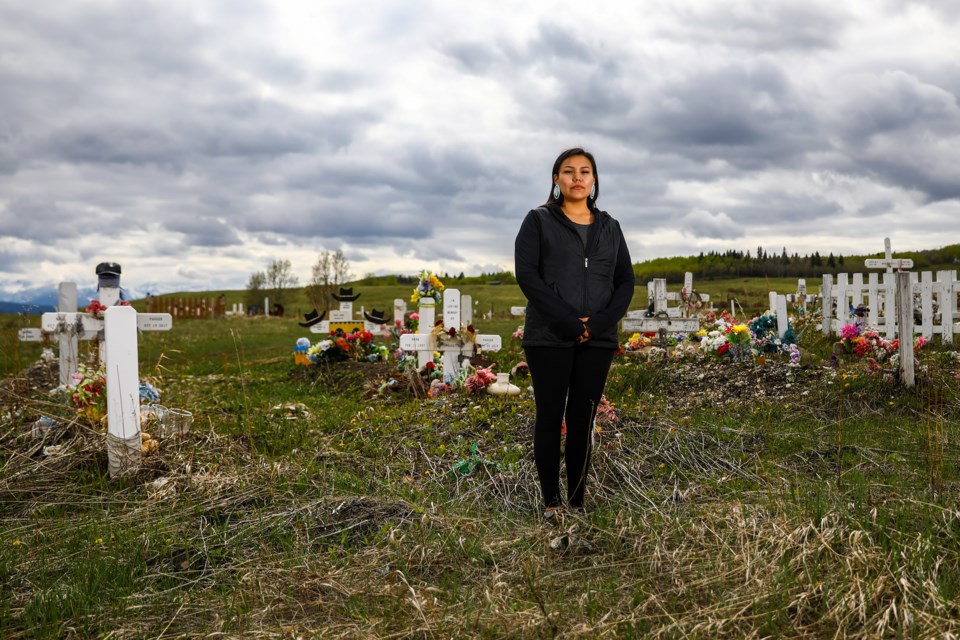Summer Twoyoungmen, Chiniki First Nation, activist
“We’ve had overdoses for many years, but recently it’s been hitting hard, it’s been one after the other, they keep dropping, and it’s because the pandemic and the dealers are getting brave enough to mix anything and that’s what causing our people to die, almost every day."
Death by drug overdose is becoming a normal part of life on the Stoney Nakoda First Nation.
The bleak reality out on the reserve isn’t a hushed, locked away secret, but in plain view; a domain where families are being painfully torn into its destruction at all times.
Hearing about who the deceased were, what passions and ambitions they had, is becoming less frequent with every premature demise.
Instead, the forgotten names are replaced by talks of another untimely funeral as loved ones mourn the heartbreaking effect of Stoney Nakoda’s drug epidemic.
“I want to stop that because how are we going to live here as a Nation, as one people, if we just sit by and watch our people die off and we’re not going to stand up and do anything?” said Summer Twoyoungmen, founder of the Wácágâ ôkóná’gîcíyâ’bî group, meaning a shield that provides protection physically and spiritually in the Stoney language.
The group has organized protest walks against drug dealers and is circulating a petition to put the heat on chiefs and councils to ban drug dealers from the Stoney Nakoda First Nation, which has received more than 400 signatures from the fed-up community.
It is a harsh situation on the Nation, but with an unyielding confidence in her stride, leading the community’s battle against drugs is Twoyoungmen; a persistent young woman whose actions are reaching deep and inspiring more to step up and say “no more.”
Drug use and dealing – particularly methamphetamine and heroin – are described as the biggest issue on the First Nation by local RCMP, which made a series of arrests in May and June, busting dealers.
However, a bigger change is needed, said Twoyoungmen.
The grassroots petition is asking chiefs and councils to implement a bylaw banning drug dealers from the reserve for up to five years.
“Even when they are arrested, what happens next?” Twoyoungmen said. “They get arrested and thrown in jail, they get a bail hearing, they get let out and they come back and do it all over again.
“We have to do this as a grassroots petition in order for [chiefs and councils] to do something.”
Twoyoungmen added that the introduction of more jobs for Nation members, additional athletic programs for youth, and a safe treatment centre, could all contribute positively in the fight against drugs.
As her speeches and words stir emotions in others, and more from across the Nation reach out in support, the fight against drugs has been a personal battle for Twoyoungmen. She’s overcome addiction, being drug-free for more than two years, but she knows its deadly effects continue to have stranglehold on friends and family.
She’s attended at least seven funerals for those who suffered and died because of addiction with the most recent being last January for Carol Verna Snow-Houle, Twoyoungmen's mother.
Standing in the Wesley cemetery at her mother’s grave, a three-time cancer survivor and a believer in keeping culture and traditions alive, Twoyoungmen is at peace knowing her parent’s suffering and struggles have ended.
She said its up to her and her siblings to break the cycling of addiction in their family – and to try and finally kick out drug pushers from the reserve for Stoney Nakoda's next generation.
“I know for sure what it’s like to be there in addiction and feeling like there’s no hope, like everyone’s given up on you because you’re an addict, you know, they don’t see you as anything else but an addict,” Twoyoungmen said.
“When I was in addiction, there was no one else like me and I wish there was, you know, someone wanting to fight for me, someone wanting to save me, or save the youth, at least. So that plays a really big part in why I’m doing it.”
Support programs for those in need on the Nation include the Mînî Thnî Crisis Support team, Harm Reduction and Sexual Services and Turning Point Community Wellness.



